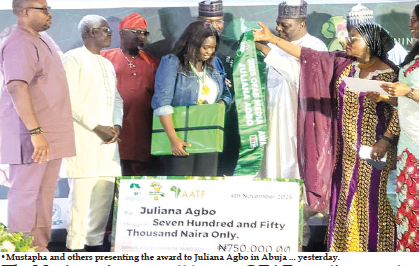
The Nation has won overall best at the Ninth Open Forum on Agricultural Biotechnology (OFAB) Nigeria Media Awards.
The newspaper’s reporter, Juliana Agbo, clinched the award across print, radio, and television categories, earning top recognition for her contributions to science and agricultural biotechnology reporting in Nigeria.
Director General of National Biotechnology Research and Development Agency (NBRDA), Prof. Abdullahi Mustapha, lauded journalists for their commitment to promoting science-based and factual reporting that deepens public understanding of agricultural biotechnology and its benefits to national development.
Mustapha described journalists, editors, and broadcasters as “vital partners” in translating complex scientific innovations into information that improves lives of farmers and consumers.
He said the annual OFAB media awards have become a symbol of excellence in journalism that champions innovation and accurate communication of biotechnology breakthroughs, adding media advocacy shapes policy, drive public trust, and support national food security.
“Your work matters. It shapes debate, informs policy, and translate scientific innovations into benefits for farmers, consumers and the nation,” he said.
Prof. Mustapha lauded OFAB Nigeria for serving as a bridge between science and society by providing a platform where scientists, policymakers, and farmers exchange ideas and where myths about biotechnology are dispelled through evidence-based reporting.
Noting NBRDA’s achievements, he said biotech crops developed with research institutions, such as pod-borer resistant cowpea, TELA maize, and Bt cotton have moved from lab trials to farmers’ fields with good results.
In her presentation: “Counting the Gains: OFAB Nigeria’s Impact on Food Security and the Renewed Hope Agenda Initiative,” Director of Agricultural Biotechnology at NBRDA, Dr. Rose Gidado, noted the forum’s advocacy, which empowered over 50,000 farmers and engaged policymakers, academics, and civil society groups.
Gidado said OFAB Nigeria’s outreach contributed to a 25 per cent hike in staple crop yields in adopting regions, resulting in additional 1.2 million metric tonnes of food annually and reducing food import by 15 per cent.
“OFAB has redefined science advocacy, turning fear into faith, scepticism into adoption, and scarcity into abundance”. She added that Ghana, Mozambique, Kenya, Uganda, Tanzania, and Ethiopia have adopted Nigeria’s model to strengthen their biotech and biosafety frameworks.
The awards celebrate excellence in journalism that promotes awareness and understanding of agricultural biotechnology and its role in advancing food security and sustainable development.
This year’s edition brought together journalists, scientists, policymakers, and stakeholders in the agricultural sector to honour media professionals who have demonstrated exceptional commitment to accurate and impactful reporting on biotechnology.
Agbo’s recognition underscores The Nation’s consistent leadership in science communication and its dedication to fostering informed public discourse on agricultural innovations in Nigeria.


